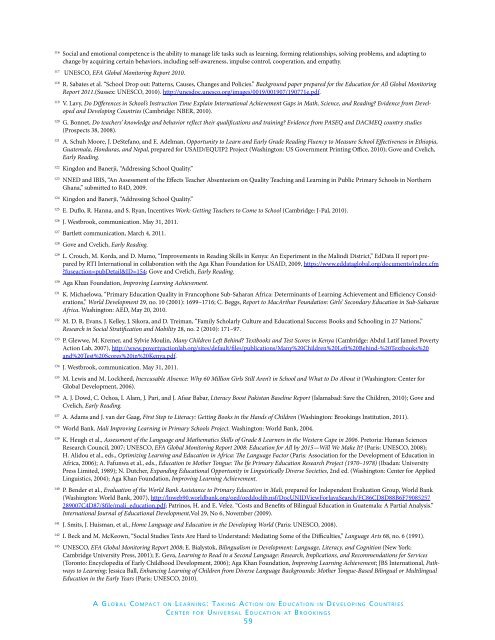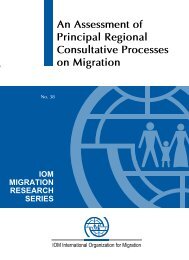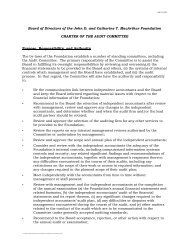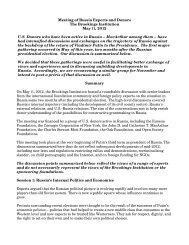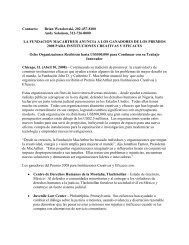A Global Compact on Learning - Brookings Institution
A Global Compact on Learning - Brookings Institution
A Global Compact on Learning - Brookings Institution
Create successful ePaper yourself
Turn your PDF publications into a flip-book with our unique Google optimized e-Paper software.
116<br />
Social and emoti<strong>on</strong>al competence is the ability to manage life tasks such as learning, forming relati<strong>on</strong>ships, solving problems, and adapting to<br />
change by acquiring certain behaviors, including self-awareness, impulse c<strong>on</strong>trol, cooperati<strong>on</strong>, and empathy.<br />
117<br />
UNESCO, EFA <str<strong>on</strong>g>Global</str<strong>on</strong>g> M<strong>on</strong>itoring Report 2010.<br />
118<br />
R. Sabates et al. “School Drop out: Patterns, Causes, Changes and Policies.” Background paper prepared for the Educati<strong>on</strong> for All <str<strong>on</strong>g>Global</str<strong>on</strong>g> M<strong>on</strong>itoring<br />
Report 2011.(Sussex: UNESCO, 2010). http://unesdoc.unesco.org/images/0019/001907/190771e.pdf.<br />
119<br />
V. Lavy, Do Differences in School’s Instructi<strong>on</strong> Time Explain Internati<strong>on</strong>al Achievement Gaps in Math, Science, and Reading? Evidence from Developed<br />
and Developing Countries (Cambridge: NBER, 2010).<br />
120<br />
G. B<strong>on</strong>net, Do teachers’ knowledge and behavior reflect their qualificati<strong>on</strong>s and training? Evidence from PASEQ and DACMEQ country studies<br />
(Prospects 38, 2008).<br />
121<br />
A. Schuh Moore, J. DeStefano, and E. Adelman, Opportunity to Learn and Early Grade Reading Fluency to Measure School Effectiveness in Ethiopia,<br />
Guatemala, H<strong>on</strong>duras, and Nepal, prepared for USAID/EQUIP2 Project (Washingt<strong>on</strong>: US Government Printing Office, 2010); Gove and Cvelich,<br />
Early Reading.<br />
122<br />
Kingd<strong>on</strong> and Banerji, “Addressing School Quality.”<br />
123<br />
NNED and IBIS, “An Assessment of the Effects Teacher Absenteeism <strong>on</strong> Quality Teaching and <strong>Learning</strong> in Public Primary Schools in Northern<br />
Ghana,” submitted to R4D, 2009.<br />
124<br />
Kingd<strong>on</strong> and Banerji, “Addressing School Quality.”<br />
125<br />
E. Duflo, R. Hanna, and S. Ryan, Incentives Work: Getting Teachers to Come to School (Cambridge: J-Pal, 2010).<br />
126<br />
J. Westbrook, communicati<strong>on</strong>. May 31, 2011.<br />
127<br />
Bartlett communicati<strong>on</strong>, March 4, 2011.<br />
128<br />
Gove and Cvelich, Early Reading.<br />
129<br />
L. Crouch, M. Korda, and D. Mumo, “Improvements in Reading Skills in Kenya: An Experiment in the Malindi District,” EdData II report prepared<br />
by RTI Internati<strong>on</strong>al in collaborati<strong>on</strong> with the Aga Khan Foundati<strong>on</strong> for USAID, 2009, https://www.eddataglobal.org/documents/index.cfm<br />
?fuseacti<strong>on</strong>=pubDetail&ID=154; Gove and Cvelich, Early Reading.<br />
130<br />
Aga Khan Foundati<strong>on</strong>, Improving <strong>Learning</strong> Achievement.<br />
131<br />
K. Michaelowa, “Primary Educati<strong>on</strong> Quality in Francoph<strong>on</strong>e Sub-Saharan Africa: Determinants of <strong>Learning</strong> Achievement and Efficiency C<strong>on</strong>siderati<strong>on</strong>s,”<br />
World Development 29, no. 10 (2001): 1699–1716; C. Beggs, Report to MacArthur Foundati<strong>on</strong>: Girls’ Sec<strong>on</strong>dary Educati<strong>on</strong> in Sub-Saharan<br />
Africa. Washingt<strong>on</strong>: AED, May 20, 2010.<br />
132<br />
M. D. R. Evans, J. Kelley, J. Sikora, and D. Treiman, “Family Scholarly Culture and Educati<strong>on</strong>al Success: Books and Schooling in 27 Nati<strong>on</strong>s,”<br />
Research in Social Stratificati<strong>on</strong> and Mobility 28, no. 2 (2010): 171–97.<br />
133<br />
P. Glewwe, M. Kremer, and Sylvie Moulin, Many Children Left Behind? Textbooks and Test Scores in Kenya (Cambridge: Abdul Latif Jameel Poverty<br />
Acti<strong>on</strong> Lab, 2007), http://www.povertyacti<strong>on</strong>lab.org/sites/default/files/publicati<strong>on</strong>s/Many%20Children%20Left%20Behind-%20Textbooks%20<br />
and%20Test%20Scores%20in%20Kenya.pdf.<br />
134<br />
J. Westbrook, communicati<strong>on</strong>. May 31, 2011.<br />
135<br />
M. Lewis and M. Lockheed, Inexcusable Absence: Why 60 Milli<strong>on</strong> Girls Still Aren’t in School and What to Do About it (Washingt<strong>on</strong>: Center for<br />
<str<strong>on</strong>g>Global</str<strong>on</strong>g> Development, 2006).<br />
136<br />
A. J. Dowd, C. Ochoa, I. Alam, J. Pari, and J. Afsar Babar, Literacy Boost Pakistan Baseline Report (Islamabad: Save the Children, 2010); Gove and<br />
Cvelich, Early Reading.<br />
137<br />
A. Adams and J. van der Gaag, First Step to Literacy: Getting Books in the Hands of Children (Washingt<strong>on</strong>: <strong>Brookings</strong> Instituti<strong>on</strong>, 2011).<br />
138<br />
World Bank. Mali Improving <strong>Learning</strong> in Primary Schools Project. Washingt<strong>on</strong>: World Bank, 2004.<br />
139<br />
K. Heugh et al., Assessment of the Language and Mathematics Skills of Grade 8 Learners in the Western Cape in 2006. Pretoria: Human Sciences<br />
Research Council, 2007; UNESCO, EFA <str<strong>on</strong>g>Global</str<strong>on</strong>g> M<strong>on</strong>itoring Report 2008: Educati<strong>on</strong> for All by 2015—Will We Make It? (Paris: UNESCO, 2008);<br />
H. Alidou et al., eds., Optimizing <strong>Learning</strong> and Educati<strong>on</strong> in Africa: The Language Factor (Paris: Associati<strong>on</strong> for the Development of Educati<strong>on</strong> in<br />
Africa, 2006); A. Fafunwa et al., eds., Educati<strong>on</strong> in Mother T<strong>on</strong>gue: The Ife Primary Educati<strong>on</strong> Research Project (1970–1978) (Ibadan: University<br />
Press Limited, 1989); N. Dutcher, Expanding Educati<strong>on</strong>al Opportunity in Linguistically Diverse Societies, 2nd ed. (Washingt<strong>on</strong>: Center for Applied<br />
Linguistics, 2004); Aga Khan Foundati<strong>on</strong>, Improving <strong>Learning</strong> Achievement.<br />
140<br />
P. Bender et al., Evaluati<strong>on</strong> of the World Bank Assistance to Primary Educati<strong>on</strong> in Mali, prepared for Independent Evaluati<strong>on</strong> Group, World Bank<br />
(Washingt<strong>on</strong>: World Bank, 2007), http://lnweb90.worldbank.org/oed/oeddoclib.nsf/DocUNIDViewForJavaSearch/FC86CD8D88B6F79085257<br />
289007C4D87/$file/mali_educati<strong>on</strong>.pdf; Patrinos, H. and E. Velez. “Costs and Benefits of Bilingual Educati<strong>on</strong> in Guatemala: A Partial Analysis.”<br />
Internati<strong>on</strong>al Journal of Educati<strong>on</strong>al Development,Vol 29, No 6, November (2009).<br />
141<br />
J. Smits, J. Huisman, et al., Home Language and Educati<strong>on</strong> in the Developing World (Paris: UNESCO, 2008).<br />
142<br />
I. Beck and M. McKeown, “Social Studies Texts Are Hard to Understand: Mediating Some of the Difficulties,” Language Arts 68, no. 6 (1991).<br />
143<br />
UNESCO, EFA <str<strong>on</strong>g>Global</str<strong>on</strong>g> M<strong>on</strong>itoring Report 2008; E. Bialystok, Bilingualism in Development: Language, Literacy, and Cogniti<strong>on</strong> (New York:<br />
Cambridge University Press, 2001); E. Geva, <strong>Learning</strong> to Read in a Sec<strong>on</strong>d Language: Research, Implicati<strong>on</strong>s, and Recommendati<strong>on</strong>s for Services<br />
(Tor<strong>on</strong>to: Encyclopedia of Early Childhood Development, 2006); Aga Khan Foundati<strong>on</strong>, Improving <strong>Learning</strong> Achievement; JBS Internati<strong>on</strong>al, Pathways<br />
to <strong>Learning</strong>; Jessica Ball, Enhancing <strong>Learning</strong> of Children from Diverse Language Backgrounds: Mother T<strong>on</strong>gue-Based Bilingual or Multilingual<br />
Educati<strong>on</strong> in the Early Years (Paris: UNESCO, 2010).<br />
A <str<strong>on</strong>g>Global</str<strong>on</strong>g> Compa c t <strong>on</strong> <strong>Learning</strong>: Taking Acti<strong>on</strong> <strong>on</strong> Educat i o n in Developing Countries<br />
C e n t e r for Universal Educat i o n at <strong>Brookings</strong><br />
59


